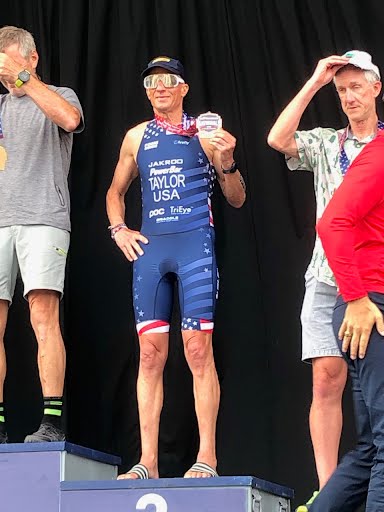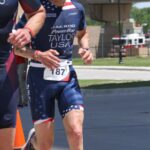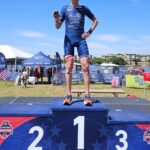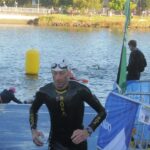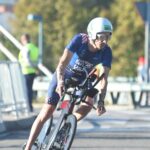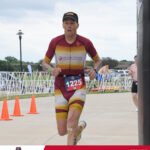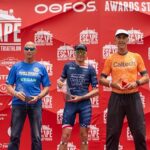As I described in Part I of my experience at the recently completed USAT National Olympic and Sprint Championships, my first race, the Olympic distance, was a source of some tribulation for me. That discomfort continued through the day post-race and when I woke up and prepared for my Sprint-distance race the following day.
discomfort continued through the day post-race and when I woke up and prepared for my Sprint-distance race the following day.
Pre-race
I had a decent sleep on Saturday night and felt physically rested and ready to race. But I also woke up with an undefined emotional feeling that didn’t feel good. I arrived at the race venue about 1:40 hours before my wave start time and that nagging feeling kept getting worse. After setting up my transition and  completing my physical warm-up, I lay down on the grass near the swim start and I was clearly not in a good place mentally. I was totally not excited to race and was having thoughts that I’ve never had before on race day: “I really don’t want to do this,” “This isn’t going to be any fun,” and, most disturbingly, “Maybe I’m done with triathlon.” (That last one really scared me!).
completing my physical warm-up, I lay down on the grass near the swim start and I was clearly not in a good place mentally. I was totally not excited to race and was having thoughts that I’ve never had before on race day: “I really don’t want to do this,” “This isn’t going to be any fun,” and, most disturbingly, “Maybe I’m done with triathlon.” (That last one really scared me!).
But I was obviously going to do the race, so I used many of the mental tools I offer my clients on myself: positive and energizing self-talk, mental imagery, breathing, physical activation, and smiling, to name a few. As I did my warm-up swim just before my start and as I settled into the water next to my fellow competitors awaiting the start horn, I adopted my usual “bring it on” attitude to get myself hyped up and ready to charge.
One transition mistake that I will learn from. When I set up my transition area the morning of races, I usually pull out and review my laminated checklist to ensure that I have everything I need and do everything I need to do. Well, on Sunday morning, I just plain forgot to review my checklist and, as a result, forgot to load my PowerBar chews into my bento box. There’s no way to tell if my lack of nutrition impacted my race performance (though, as I will explain below, the competitor in front of me beat me by only seven seconds), but it was a distraction and it couldn’t have helped.
everything I need to do. Well, on Sunday morning, I just plain forgot to review my checklist and, as a result, forgot to load my PowerBar chews into my bento box. There’s no way to tell if my lack of nutrition impacted my race performance (though, as I will explain below, the competitor in front of me beat me by only seven seconds), but it was a distraction and it couldn’t have helped.
Also, four of the six guys in my age group who beat me in the Olympic-distance race, including the  perennial winner, Tony Schiller, were also racing in the Sprint. Given the strength of the field, I had no expectations for the race, but did have a goal of getting on the podium, despite my bad attitude that morning.
perennial winner, Tony Schiller, were also racing in the Sprint. Given the strength of the field, I had no expectations for the race, but did have a goal of getting on the podium, despite my bad attitude that morning.
Swim
I felt surprisingly good the first few minutes of the swim, and, to my surprise, I soon sensed a switch flip inside of me. My energy increased, my mindset turned positive, and I began to feel excited about the race. I finished the swim strong and felt ready to attack the rest of the race.
T1
As I noted in my last post, I have made my transitions a priority that involves sprinting from the Swim Out to the Bike Out and this one was no different. I had a great transition to the bike mount line and nailed flying mount.
flying mount.
Bike
As soon as I settled into the bike, I knew something was different than the day before. Even though I was pushing the pace, my legs felt good, and I was pushing about 20 more watts than on Saturday in the early part of the race. Plus, I was passing a bunch of people. However, as I approached the overpass climb, two guys in my age group passed me, followed by another a few minutes later. I assumed that, like on Saturday, I wouldn’t see them again on the bike (except after the  turnaround) and that I had no chance to catch them. But an amazing thing happened. Over the last three miles of the bike, I reeled them all in and we came into T2 together. This surprising turn of events gave me confidence heading into the run because that’s my strength. Plus, as I noted in analyzing my bike data after the race, I rode at a pace that was 20 watts higher than the day before.
turnaround) and that I had no chance to catch them. But an amazing thing happened. Over the last three miles of the bike, I reeled them all in and we came into T2 together. This surprising turn of events gave me confidence heading into the run because that’s my strength. Plus, as I noted in analyzing my bike data after the race, I rode at a pace that was 20 watts higher than the day before.
T2
My transition went flawlessly, getting my shoes on quickly and grabbing my hat, sunglasses, and number belt, and putting them on at a full sprint as I headed to the run out.
Run
This part of the race was the most fun! As I left the transition area, my legs felt great, and I saw that I was on the heels of another guy in my age group who was clearly a good runner. I didn’t know who he was at the time, but later learned that he was Tim Brown, who finished second the day before. It has been rare for me to actually race someone in a triathlon, so I saw this as a great challenge.
the time, but later learned that he was Tim Brown, who finished second the day before. It has been rare for me to actually race someone in a triathlon, so I saw this as a great challenge.
As I settled in behind Tim, my plan was to just follow him the entire race and then put on a surge and, hopefully, pass him near the finish. However, at about 1.25 miles, he slowed to get some water at an aid station, so I passed him. Again, I didn’t know who he was or how good a runner he was at the time, so I thought I would just continue to build a gap and leave him behind. Unfortunately, I didn’t. He sat on my heels and just followed me for a while and let me burn some matches  worrying about and trying to drop him. At about mile 5, he passed me, but I was able to stay within a few seconds of him, though not right behind him. With less than a mile to the finish, he put on a surge, and I went with him. But, at that point, I didn’t have anything more to give and he maintained his lead to the finish.
worrying about and trying to drop him. At about mile 5, he passed me, but I was able to stay within a few seconds of him, though not right behind him. With less than a mile to the finish, he put on a surge, and I went with him. But, at that point, I didn’t have anything more to give and he maintained his lead to the finish.
Post-race
I was still thrilled to have finished 3rd against such a tough field. And racing against Tim on the run was extra fun, even if I wasn’t able to prevail. I was especially pleased with my bike in which I was able to reel in the two of the guys who passed me earlier. Plus, I had flipped in the Sprint two of the guys who had beaten me the day before in the Olympic. Finally, for the third year in a row, I had a very strong Sprint race the day after a demanding Olympic distance.
A lot of the negativity that I felt leading up to the start of the Sprint had melted away as I basked in the strength of my race. In fact, as quickly as I had lost my tri-mojo, I have found it again, and felt excited to return home and hit my training hard in preparation for the Super-sprint and Olympic-distance races at the World Championships in Pontevedra, Spain in late September.
There was some questions that continued to nag at me in light of my feelings after the Olympic and before the Sprint.
What caused my existential crisis after the Olympic race? Was it temporary and due to physical fatigue or was it more lasting and insidious that I needed to explore in more depth (I think I need a sport psychologist!)?
How could I have been stronger and faster on Sunday after feeling flat from the physical demands of the Olympic-distance race on Saturday (my coach had some ideas about this related to having focused on shorter distances in training until just recently)?
Finally, do I even want to do Olympic-distance races in the future (though it seems a bit childish because 7th place in a National Championship is still pretty darned good) or should I focus on my strengths in the shorter-distance events?
Much to ponder in my future in triathlon. In the meantime, I have my final “A” races of the season to prepare for!

